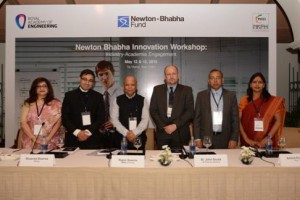
The SIN team in India is working with the RAEng, who are the UK’s national academy for engineering, as a delivery partner for the Higher Education Partnership (HEP) programme under Newton Bhabha. We partnered with FICCI because of their track record in the field of higher education including introducing the National Knowledge Functional Hub model. This model is similar to the HEP programme that is proposed to be implemented in India.
The objective of HEP is to enhance the quality of engineering graduates and create institutional research and teaching partnerships. Focussed around bilateral academic and industry exchange placements, these partnerships will help in catalysing technology transfer between industry and academia in India and also the UK. HEP will work on a ‘hub and spoke’ model, with ‘hub’ universities being funded to carry out exchanges with industry and disseminating their experiences and best practice through workshops with ‘spoke’ universities, with the objectives to share international knowledge and best practice, enhance the teaching curricula, and inculcate technology entrepreneurship and innovation capacity among engineering students. The HEP model is based on similar successful programmes run by the academy in Africa and UK.
There was widespread participation from several engineering universities and institutions across Western and Northern India and major industry players like Rolls Royce, Larsen and Toubro, Thermax India and Chemtrols. A seven member delegation from UK, led by the Vice President of Royal Academy of Engineering and representatives from the University of Cambridge, University of Surrey, University of Leeds, Cranfield University and ATS Consultants were part of the workshop.
The workshop also included the India release of Confederation of Business Industry’s (CBI) report ‘Best of Both Worlds: Guide to Business University Collaboration’. The report is a comprehensive study of the benefits of partnerships between businesses and universities for research, innovation, skills and professional development and includes a number of case studies to inspire new partnerships. The detailed report can be viewed here.
So, for now the follow up action is to distil the discussions in the form of a report and apply these to design and deliver a successful HEP programme. So, look out for further news on the launch of the Newton Bhabha ‘Higher Education Partnerships’ programme soon! Please contact me for any further details!
